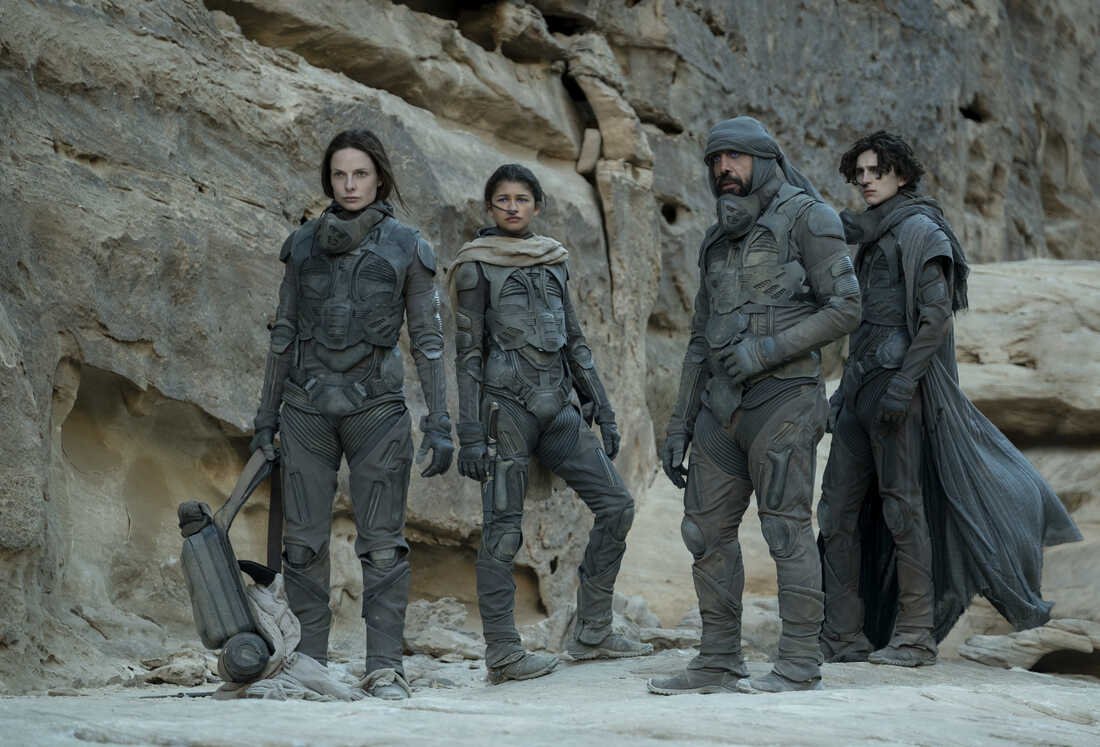DUNE
Directing: B+
Acting: B+
Writing: B
Cinematography: A-
Editing: B+
Special Effects: A
It goes without saying that there’s a lot riding on Denis Villeneuve’s Dune, the latest literary adaptation of a novel beloved for decades. Frank Herbert’s original novel, the first in a series of six (not counting a further sixteen co-written by Herbert’s son Brian and Kevin J. Anderson, with still more to come), was published in 1965. Previous attempts at screen adaptations include a notorious feature film flop by David Lynch in 1984, and a Syfy miniseries in 2000. Legions of nerds love this property. No fewer than three people I spoke with earlier today were excited just to hear that I was going to see this movie.
And here’s the thing. I have never read the novel, descriptions of which make it honestly sound tedious. Nor have I seen the 1984 film, descriptions of which make it sound horrible. I didn’t even know a miniseries ever existed until this week. Thus, as always, I can only speak to how the 2021 Dune stands on its own merits, which of course is how I believe it should be judged anyway. I still had great interest in this Dune, simply because of its director, who has proven time and again (Prisoners, Sicario, Arrival, Blade Runner 2049) that his films are not to be missed.
I just can’t decide the degree to which I feel the same way about Dune. It depends, ironically, on your knowledge of and affection for the property itself. I have a feeling people who already love the Dune story and mythology will be pleased. It should be noted that this adaptation of the first novel only covers half of it; all the marketing materials just call it Dune, but the title card makes it explicit: Dune - Part One. Villeneuve is in pre-production for Part Two and only agreed to make the film if he could do it in two parts.
I’m glad he did. This is a completely different universe from ours, and fully realized—the run time of this film is two hours and 35 minutes, which never drags. There’s a lot to pack in here, but it never feels packed; allowing this adaptation to be of only the first half, and giving it that run time, simply allows the world it presents to breathe. “Epic” is a wildly overused word anymore, but this movie is an epic in every sense of the word. Every frame elicits a sense of grandeur.
I have to admit, though, that Dune just didn’t speak to me the way I wanted it to—certainly not the way Villeneuve’s previous films have (with the notably odd and incoherent exception of Enemy). It clearly does speak the way I wanted it to, to others; my husband loved it and immediately said he wants to read the novel. It’s also arguably nonsensical to assess this movie as a complete entity at all—because it isn’t complete, by definition. It even ends fairly abruptly, as though right in the middle of the story, because that’s indeed exactly where it is. My feelings about this film may differ significantly once Part Two is released. As it is, this very review is rather like reviewing any other movie after only watching the first hour. On the other hand, there was a similar experience with Quentin Tarantino’s Kill Bill films, and in that case I had been much more enthralled with Volume I than I had been with Volume II. Still, I did not know that until I had seen both films.
And besides, Dune takes its time, letting the story unfold gradually, in ways I constantly wish other movies would. There are indeed very thrilling set pieces, but this film is comparatively meditative in its first half. It’s all story establishment and world building, as we meet Paul (Timothée Chalamet) and his parents (Oscar Isaac and Rebecca Ferguson), rulers of their home world. And we are taken to other worlds and introduced to a stunning array of other key characters from across their universe, played by countless A-list actors (Josh Brolin, Jason Momoa, Javier Bardem, Stellan Skarsgård, Dave Bautista, Charlotte Rampling, Zendaya, Chen Chang). More often than not, a movie this packed with star power crushes under the weight of it and deflates into the realm of mediocrity. Dune is far from mediocre, however.
It’s certainly a technical marvel. A whole lot of it is set in desert landscapes (consider the title), in light of which it’s remarkable how stunning it is to look at most of the time. Otherworldly creatures and vehicles, notably gargantuan sand worms, are seen sparingly and thus very effectively. There’s also a fun mode of transportation that is basically a helicopter designed like a dragonfly. The effects are seamlessly blended into practical sets, and never call attention to themselves, instead always existing in service of the story.
The story, incidentally, is pretty typical for fantasy epics: Paul is identified as a messiah, a fate he predictably resists, until—spoiler alert!—he begins to accept his destiny. It remains unclear to me exactly what he’s meant to deliver to this universe as a messiah, and related details were consistently difficult for me to follow, but such considerations are secondary. What Villeneuve truly succeeds at here is establishment of a unique tone, in a broadly realized alternate universe, unlike any other, except perhaps the source material. It may not have been quite what I wanted it to be, but I can still see it as something it needed to be, and appreciate it for what it is. I will certainly be right back to see Part Two once it finally comes out.
Rebecca Ferguson, Zendaya, Javier Bardem, and Timothée Chalamet, striking a pose on a desert rock.
Overall: B+

